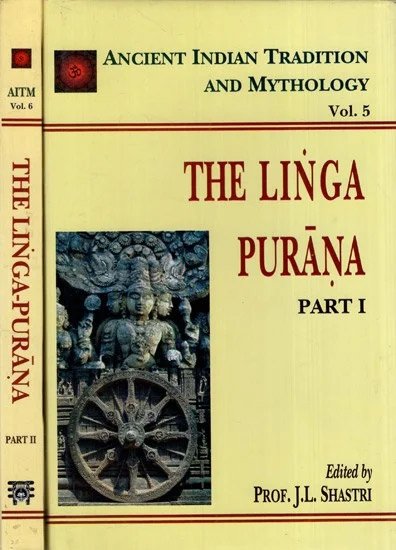The Linga Purana
by J. L. Shastri | 1951 | 265,005 words | ISBN-10: 812080340X | ISBN-13: 9788120803404
This page describes Destruction of Daksha’s sacrifice which is chapter 99 of the English translation of the Linga Purana, traditionally authored by Vyasa in roughly 11,000 Sanskrit verses. It deals with Shaiva pilosophy, the Linga (symbol of Shiva), Cosmology, Yugas, Manvantaras, Creation theories, mythology, Astronomy, Yoga, Geography, Sacred pilgrimage guides (i.e., Tirthas) and Ethics. The Lingapurana is an important text in Shaivism but also contains stories on Vishnu and Brahma.
Chapter 99 - Destruction of Dakṣa’s sacrifice
The sages said:
1-2. O Sūta of great intellect, the origin of the goddess has been indicated by you. Now, mention in detail her birth as the daughter of Menā after her self immolation as Sati in the previous birth and then the destruction of Dakṣa’s sacrifice. How was she given to Śiva, the lord of Devas, by Viṣṇu?
3-5. How was her marriage with him? It behoves you to narrate all this to us now.
On hearing their words, Sūta the most excellent among the Paurāṇikas, narrated the birth of the great goddess to those noble-souled ones.
Sūta said:
It was at the outset mentioned to Daṇḍin in detail by Brahmā; it was then mentioned to Kumāra (Sanat) by him. Then it was mentioned to Vyāsa, the intelligent sage. I have heard it from him and I am now recounting it to you all in detail.
6-7. O highly blessed ones, at your entreaty I shall mention it to you after bowing down to Umā and Śiva.
She is the mother of the universe. She is named Bhagā. She is the three-fold pedestal of the deity in the form of Liṅga. Liṅga is the lord himself. O excellent brahmins, the creation of the universe is by both of them. Śiva in the from of Liṅga is the splendour stationed above darkness.
8. īn view of the union of Liṅga and pedestal he became Ardhanārīśvara (lord with the form of a woman in one half). At the outset he created his son Brahma the four-faced lord.[1]
9. Śiva who excels the whole universe, the lord Ardhanārīśvara, full of knowledge, granted knowledge to Brahma.
10. The lord Śiva saw Brahmā being born. Brahma too saw Rudra, Śaṅkara and Mahādeva.
11. On seeing the lord Ardhanārīśvara stationed there, the lotus-born deity eulogised Śiva, the bestower of the boons, by means of pleasing words.
12. The unborn lord requested the lord the soul of the universe, by saying “Divide yourself.” He created the goddess from the left side of his body as his befitting wife.
13. This ancient splendid lady, viz:—Śraddhā,[2] became the daughter of Dakṣa at the behest of the lord.
14. At that time, her name was Satī. She resorted to Rudra alone as her husband. In course of time, she rebuked Dakṣa. The goddess then became the daughter of Menā.
15-20. It was due to the curse of Nārada that Dakṣa also was prompted to censure them. The haughty Dakṣa, dishonoured the lord of Umā contemptuously. When Satī came to know of this action of her father Dakṣa, by her yogic power she reduced her body to ashes.[3] Later she was born as goddess Pārvatī, the daughter of the lord of the mountains, and performed penance. On coming to know of this and at the instance of the son of Cyavana, the infuriated lord Bharga destroyed the extensive sacrifice of Dakṣa. The son of Cyavana was the well-known and intelligent Dadhīca. Thanks to the grace of the three-eyed lord, the leading sage conquered Viṣṇu in battle and cursed Devas along with Viṣṇu: “O Devas, your imminent destruction is by the fire originating from Rudra’s anger, due to the Māyā of Śaṅkara, the great lord.
Footnotes and references:
[1]:
Brahmāṇaṃ vidadhe devam. Gf. yo brahmāṇaṃ vidadhāti pūrvaṃ yo devānām prathamam purastāt—cited in Śivatoṣiṇī.
[2]:
Śraddhā, the first wife of Śiva who afterwards became Satī the daughter of Dakṣa. [She became Pārvatī in her third birth. Cf.—[tasyaivaṃ viduṣo yajñasyātmā yajamānaḥ śraddhā patnī]—cited in Śivatoṣiṇī. and also Ādityapurāṇa:—[mama sṛṣṭivivṛddhyarthamaṃśenaikena śāśvate | mama putrasya dakṣasya putrī bhava sureśvari || evaṃ śaktibhruvormadhyātmasarjātmasamaprabhām | ādāya śirasā śambho rājñāṃ sā parameśvarī || abhavad vakṣaduhitā svecchayā brahmarūpiṇī ||]
